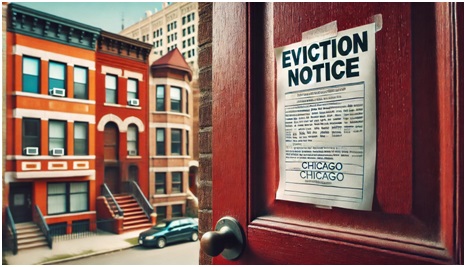Owning rental property in Chicago and its suburbs can be a rewarding investment with great returns, but it also comes with legal responsibilities that can quickly become overwhelming. Without professional property management or taking the time to learn the many legal aspects, many property owners unknowingly make legal missteps that could lead to costly fines, lawsuits, and, in worst-case scenarios, serious damage to their reputation as landlords.
At Landmark Property Management, we’ve seen firsthand how well-meaning property owners can get caught up in legal trouble simply by not being fully aware of the laws that govern rental properties. In this blog, we’ll walk you through the BIGGEST LEGAL MISTAKES property owners in Chicago and the surrounding suburbs make—and how partnering with a property management team can help you avoid them. Also be sure to check out my other blog that covers the “Legal Aspects of Property Management in Chicago,” for even more information on this very important topic! Also, it’s important to note that this is not legal advice and you should check with your attorney on any and all legal issues. If you need a referral for a great real estate attorney feel free to reach out and we can make an introduction.

1. Ignoring Chicago’s RLTO (Residential Landlord and Tenant Ordinance)
One of the most significant legal traps property owners fall into is failing to comply with the Residential Landlord and Tenant Ordinance (RLTO), which governs landlord-tenant relations in Chicago. The RLTO outlines everything from how security deposits must be handled to how quickly repairs should be made.
Common RLTO Violations:
- Improper Handling of Security Deposits: Many landlords don’t realize they must store security deposits in a separate, interest-bearing account and provide the tenant with detailed receipts. Traditional security deposits are almost never taken within Chicago due to the liability that is taken on when holding them. Instead, move in fees or surety bonds through third party companies are used frequently instead.
- Failure to Provide a Summary of Tenant Rights: Upon signing a lease, landlords are legally required to provide tenants with a summary of their rights under the RLTO. Failure to do so can result in fines.
- Delayed Repairs: The RLTO requires that certain repairs be made within a specific timeframe. If these deadlines aren’t met, tenants may withhold rent or terminate the lease.
How Property Managers Help: At Landmark, we ensure full compliance with the RLTO by managing each property according to the law, providing tenants with required documentation, and addressing maintenance requests promptly. Our expertise protects property owners from costly violations and potential legal action.
Pro Tip: Even if you only own one rental unit, the RLTO applies to you. Familiarize yourself with the ordinance or trust a professional management team to handle compliance for you.

2. Mishandling Lease Agreements
A poorly written or outdated lease agreement is a ticking time bomb for legal disputes. Many self-managing landlords use generic lease templates that don’t comply with local laws or fail to include essential clauses that protect both the landlord and tenant.
Common Lease Mistakes:
- Omitting Required Clauses: In Chicago, leases must include specific clauses, such as late fee limits and the right to a habitable living space.
- Not Accounting for Suburban Ordinances: Many suburbs, such as Evanston or Oak Park, have their own unique rules that must be included in lease agreements, and overlooking these can lead to local fines or tenant disputes. The Cook County suburbs also have their own called the CCRTLO, which has modeled off of Chicago’s RLTO.
- Vague Terms: If your lease agreement doesn’t clearly spell out expectations regarding rent payments, maintenance responsibilities, and property access, you could be leaving yourself open to legal challenges.
How Property Managers Help: Landmark Property Management uses legally compliant leases tailored to Chicago and suburban regulations. We ensure every lease includes the necessary clauses to protect your property and rental income.
Pro Tip: Lease laws and requirements vary significantly between Chicago and the suburbs, so it’s critical to have a legally airtight agreement that covers the specifics of your property’s location.

3. Improper Eviction Procedures
Evicting a tenant is rarely easy, and doing it improperly can make a bad situation worse. In Chicago, eviction laws are heavily regulated, and any misstep in the process could result in legal penalties or the eviction being dismissed by the court. When landlords start drilling locks without the proper steps the results can be devastating.
Common Eviction Mistakes:
- Failing to Provide Proper Notice: In Chicago, landlords must provide written notice before beginning the eviction process—five days for non-payment of rent and ten days for lease violations. Many property owners make the mistake of delivering verbal notices or improper written notices.
- Self-Help Evictions: Some landlords try to force tenants out by changing the locks or shutting off utilities, which is illegal and can lead to significant fines.
- Skipping the Court Process: All evictions in Chicago must go through the court system. Skipping this step can result in the tenant filing a counterclaim against you.
How Property Managers Help: At Landmark, we follow the correct legal eviction procedures to the letter. From providing proper notices to representing property owners in court, we handle the process professionally and ensure compliance with all Chicago and suburban eviction laws.
Pro Tip: Never attempt to evict a tenant without following the full legal process. Doing so can backfire and result in significant financial losses or legal repercussions.

4. Violating Fair Housing Laws
The Fair Housing Act protects tenants from discrimination based on race, color, national origin, religion, sex, disability, and familial status. In Chicago, additional protections apply, including source of income and military status. Many property owners unknowingly violate these laws during the tenant screening process or by enforcing biased rental policies.
Common Fair Housing Violations:
- Discriminating Based on Income: In Chicago, landlords cannot refuse to rent to tenants based on their use of housing vouchers (such as Section 8). Many property owners are unaware of this local rule.
- Inconsistent Tenant Screening: Using different criteria to screen applicants (e.g., requiring higher credit scores for certain applicants) can be seen as discriminatory and lead to legal action.
- Discriminatory Advertising: Even your rental listing can violate fair housing laws if it includes phrases like "no families" or "ideal for singles."
How Property Managers Help: Landmark Property Management conducts thorough tenant screenings that comply with fair housing laws, ensuring equal treatment for all applicants. We also ensure that all marketing materials are fair, inclusive, and legally compliant.
Pro Tip: Familiarize yourself with both federal and local fair housing laws. Violations can lead to costly fines, lawsuits, and damage to your reputation as a landlord.

5. Overlooking Local Property Tax Rules
Property taxes in Chicago and its suburbs can vary widely, and mismanaging them can lead to financial trouble. Some property owners fail to account for tax increases or overlook available exemptions, resulting in surprise bills or missed savings.
Common Property Tax Mistakes:
- Ignoring Tax Assessments: Property tax assessments in Cook County are recalculated every few years. Failing to contest an inaccurate assessment could mean paying significantly more in taxes than necessary.
- Missing Exemptions: Property owners may qualify for tax exemptions that reduce their overall tax bill. These can include homeowner, senior, and veteran exemptions, but many owners are unaware of these programs.
How Property Managers Help: At Landmark, we help property owners stay on top of their tax obligations and work with tax professionals to ensure they take advantage of all applicable exemptions. We also monitor property tax assessments and guide property owners through the appeals process if needed.
Pro Tip: Review your property’s tax assessment regularly and consult a professional to explore potential savings through exemptions or appeals.
Conclusion: Avoid Legal Pitfalls with Professional Management
Navigating Chicago’s complex legal disputes and overall landscape can be overwhelming for property owners—especially those managing their properties without professional assistance. From staying compliant with the RLTO to handling evictions and tenant disputes, there are countless legal responsibilities that can’t be ignored.
At Landmark Property Management, we specialize in helping property owners avoid costly legal mistakes while maximizing the profitability of their investments. If you want to stay on the right side of the law and protect your property from legal risks, contact us today to see how we can make your life as a landlord easier and more profitable.







